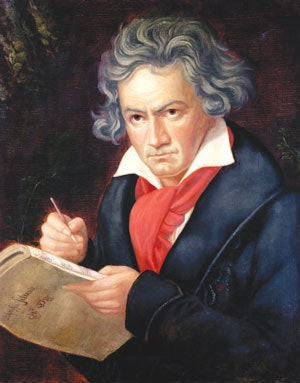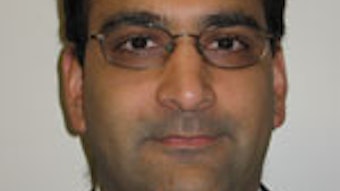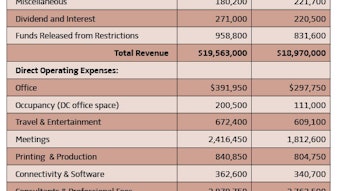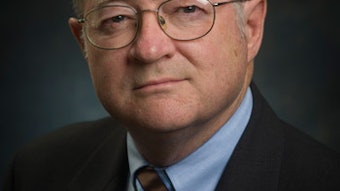Beethoven’s Deafness: Migraine-related Hearing Loss?
Kanwar S. Kelley, MD, JD Bryan Brandon, BS Hamid Z. Djalilian, MD For 200 years, the cause of Ludwig van Beethoven’s deafness has been the subject of much conjecture and intrigue. A great deal of controversy exists about Beethoven’s illnesses, of which there were many, and about the cause of his death. Many have tried to establish a unifying theory for his various illnesses, citing syphilis, Crohn’s, and lupus as potential diagnoses.1 What we do know is Beethoven exhibited diminished speech discrimination, hyperacusis, and progressive bilateral hearing loss (left greater than right), progressing to profound deafness during the course of his life, which was associated with constant bilateral tinnitus, but no vertigo.2 For the first time, we propose migraine-related hearing loss as a possible etiology of his deafness. There is evidence from various accounts that Beethoven suffered from chronic headaches, and it has been theorized that these headaches were migraine-related.3 Unfortunately, there is little literature documenting the exact nature of the headaches, but we do know Beethoven suffered from nearly all of the most common migraine triggers—poor sleep, irregular diet, and symptoms consistent with irritable bowel syndrome, which is frequently related to migraines.4,5 He was afflicted by recurrent colicky abdominal pain and alternating bouts of diarrhea and constipation, which have led many to believe he suffered from inflammatory bowel disease.6 In 1810, the same year as his last documented bout of headaches, he was described as having poor, “fitful” sleep, preferring wakefulness to any kind of sleep.4,5 In addition, Beethoven was noted to have a long history of depressive symptoms and myriad of life stressors.4 While the cause of Ludwig van Beethoven’s hearing loss will likely forever remain unknown, we propose adding migraine-related hearing loss to the long differential diagnosis. References Kubba A, Young M. Ludwig van Beethoven: a medical biography. Lancet. 1996;347:67-70. Shearer PD. The deafness of Beethoven: an audiologic and medical overview. Am J Otol. 1990;11: 370-374. Davies PJ. Beethoven in person: his deafness, illnesses, and death. Westport, CT: Greenwood Press; 2001. François MM. Diagnosing genius: the life and death of Beethoven. Ithaca, NY: McGill-Queen’s University Press; 2007. Albrecht T. Letters to Beethoven and other correspondence. Lincoln, NE: University ofNebraska Press; 1996. Cooper M. Beethoven: the last decade. New York, NY: OxfordUniversity Press; 1985.
 Ludwig van Beethoven, composer.
Ludwig van Beethoven, composer.Kanwar S. Kelley, MD, JD
Bryan Brandon, BS
Hamid Z. Djalilian, MD
For 200 years, the cause of Ludwig van Beethoven’s deafness has been the subject of much conjecture and intrigue. A great deal of controversy exists about Beethoven’s illnesses, of which there were many, and about the cause of his death. Many have tried to establish a unifying theory for his various illnesses, citing syphilis, Crohn’s, and lupus as potential diagnoses.1
What we do know is Beethoven exhibited diminished speech discrimination, hyperacusis, and progressive bilateral hearing loss (left greater than right), progressing to profound deafness during the course of his life, which was associated with constant bilateral tinnitus, but no vertigo.2
For the first time, we propose migraine-related hearing loss as a possible etiology of his deafness. There is evidence from various accounts that Beethoven suffered from chronic headaches, and it has been theorized that these headaches were migraine-related.3
Unfortunately, there is little literature documenting the exact nature of the headaches, but we do know Beethoven suffered from nearly all of the most common migraine triggers—poor sleep, irregular diet, and symptoms consistent with irritable bowel syndrome, which is frequently related to migraines.4,5
He was afflicted by recurrent colicky abdominal pain and alternating bouts of diarrhea and constipation, which have led many to believe he suffered from inflammatory bowel disease.6
In 1810, the same year as his last documented bout of headaches, he was described as having poor, “fitful” sleep, preferring wakefulness to any kind of sleep.4,5 In addition, Beethoven was noted to have a long history of depressive symptoms and myriad of life stressors.4
While the cause of Ludwig van Beethoven’s hearing loss will likely forever remain unknown, we propose adding migraine-related hearing loss to the long differential diagnosis.
References
Kubba A, Young M. Ludwig van Beethoven: a medical biography. Lancet. 1996;347:67-70.
Shearer PD. The deafness of Beethoven: an audiologic and medical overview. Am J Otol. 1990;11: 370-374.
Davies PJ. Beethoven in person: his deafness, illnesses, and death. Westport, CT: Greenwood Press; 2001.
François MM. Diagnosing genius: the life and death of Beethoven. Ithaca, NY: McGill-Queen’s University Press; 2007.
Albrecht T. Letters to Beethoven and other correspondence. Lincoln, NE: University ofNebraska Press; 1996.
Cooper M. Beethoven: the last decade. New York, NY: OxfordUniversity Press; 1985.

















